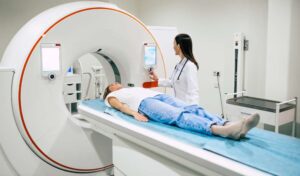 If you have damage to internal organs, bones, or tissues, your doctor can take a look at what is going on inside you without opening you up for surgery by using an MRI scan. Your doctor may use an MRI scan to diagnose an injury, issue, or disease, such as a broken bone, circulation problem, or a tumor. There are many reasons why your doctor could use an MRI scan to help support their diagnosis that will then inform your treatment plan.
If you have damage to internal organs, bones, or tissues, your doctor can take a look at what is going on inside you without opening you up for surgery by using an MRI scan. Your doctor may use an MRI scan to diagnose an injury, issue, or disease, such as a broken bone, circulation problem, or a tumor. There are many reasons why your doctor could use an MRI scan to help support their diagnosis that will then inform your treatment plan.
An MRI scan is a type of diagnostic imaging tool that uses advanced technologies to take highly detailed images of your internal structures. “Magnetic resonance imaging”, abbreviated MRI, refers to a type of diagnostic tool that uses high-powered magnets and radio waves to take cross-sectional pictures of a specific part of your body. Unlike X-rays and CT scans, an MRI scan does not expose you to any radiation and provides your doctor with much more detailed images of your injury or illness.
Open MRI vs. Closed MRI
What should you expect with when getting an MRI? The traditional MRI is also known as a closed MRI, where you lie on a table that is then inserted into a large, round tube. You may have seen these on TV or in movies when the doctor is then able to see images of the patients’ brain or internal organs. The closed MRI is the most accurate type of MRI scan and can be used to take images of any part of the body.
As technologies have advanced, the open MRI was developed as an alternate option to the closed MRI. Certain circumstances can prevent someone from getting a closed MRI, including claustrophobia or a person’s size. In these cases, an open MRI may be recommended so the doctor can still get the best images of the affected area. An open MRI may also be recommended for patients who are unable to lie down and may need to sit or stand due to injury or pain.
MRI with Contrast
In some cases, your doctor may request an MRI with contrast, which means a contrast dye will be injected before the scan begins. An MRI with contrast can show how your blood is flowing so your doctor can assess your heart functioning, and the dye can also be absorbed into certain tissues, making internal organs and even tumors more visible on an MRI. Your doctor may recommend an MRI with contrast with an open or closed MRI scan.
Functional MRI
A functional MRI, also commonly known as an fMRI, gauges blood flow to the brain and also assesses brain activity. Your doctor may request a functional MRI to see how and when certain areas of the brain light up as they are activated by certain thoughts or actions. Doctors typically utilize a functional MRI to diagnose and assess brain injuries, brain and blood flow concerns, and degenerative diseases including dementia and Alzheimer’s disease.
Musculoskeletal MRI
A musculoskeletal MRI is a type of MRI scan that is used to diagnose various injuries or illnesses that affect the musculoskeletal system. This may include a broken bone that is affecting nearby tissues or nerves, a spinal disc issue, or back and neck pain with unknown origins. If you have a car accident injury, your doctor may request this type of MRI scan to assess how your soft tissues may have been damaged. Spinal degeneration, hairline fractures, dislocated joints, and cartilage damage can all be seen using a musculoskeletal MRI.
Cardiac MRI
A cardiac MRI provides highly detailed images of how your heart structure, blood vessels, and arteries are all working to support the circulatory system and identify any damage or blockages. Your doctor may request a cardiac MRI if they suspect you have experienced a heart attack and to assess any potential damage. If you have a history of heart attacks, a cardiac MRI can provide your doctor with more information on how your circulatory system may have been damaged and whether there are any lingering problems with the heart’s chambers or heart valves. A cardiac MRI can also detect tumors in or around the heart as well as any inflammation that may affect healthy functioning.
Visit our clinic in Lithia Springs and experience the comprehensive care AICA Orthopedics offers everyone, including multi-specialty doctors and MRI scans and other diagnostic imaging tools all available in-house so we can get the help you need right away.
